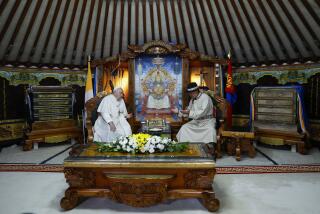Pope’s Mass Marks Rise of Faith in Africa
- Share via
ONITSHA, Nigeria — On a vast plain of red dust once destined to be an airport, in the smothering heat of a damp gray sub-Saharan haze, Pope John Paul II gathered more than half a million Roman Catholics here Sunday for a milestone in the spread of their faith across Africa.
Far back in the riotously colorful sea of humanity, one of the largest crowds ever for a Mass on this continent, Raymond Ucheuma dropped to his knees and pondered the man of the hour--a Nigerian monk being beatified by the pope in a step toward becoming West Africa’s first saint.
“It gives you hope,” said Ucheuma, a buoyant 34-year-old town planner and member of the Ibo ethnic group. “Now the average Ibo can believe that it’s conceivable to please the Lord and follow our brother’s blessed footsteps. The idea of sainthood for us is no longer beyond the realm of possibility.”
Africa is Catholicism’s prime growth area. The church has gained 20 million faithful in the past decade to surpass the 100 million mark, according to Vatican figures. John Paul has visited the continent 13 times and assigned resident nuncios, or ambassadors, in 25 of its 53 countries.
Sunday’s beatification of Father Cyprian Michael Iwene Tansi, who died in 1964, was both a nod and a boost to the church’s growing African presence--and an occasion to assert its moral influence.
Baptized by an Irish priest nine years after his birth in 1903, Tansi is “a prime example of the fruits of holiness which have grown and matured in the church” since the arrival of European missionaries more than a century ago, John Paul told the worshipers. “Taking the Christian way of life as his own, he made it truly African and Nigerian.”
The pope held up Tansi’s example as a preacher of reconciliation to lecture Nigeria’s military rulers.
“All Nigerians must work to rid society of everything that offends the dignity of the human person or violates human rights,” he said in his homily. “This means reconciling differences, overcoming ethnic rivalries and injecting honesty, efficiency and competence into the art of governing.
“There can be no place for intimidation and domination of the poor and the weak, for arbitrary exclusion of individuals and groups from political life, for the misuse of authority or the abuse of power,” he added, drawing applause from the huge, festive crowd.
Nigeria, sub-Saharan Africa’s most populous country and one of its richest, is an important testing ground for the church’s influence on the continent, even though Catholics make up just 12 million of the country’s 104 million people.
Catholic bishops here have taken a prominent role in denouncing what they call a brutal, corrupt and violent dictatorship. A Nigerian disciple of Tansi, Cardinal Francis Arinze, leads the Vatican’s worldwide effort to improve ties with Islam, the dominant faith here and in many African nations.
Arriving Saturday for a three-day visit, John Paul called on Gen. Sani Abacha’s regime to release about 60 prisoners as a sign of Abacha’s intent to restore civilian rule this fall.
While promising only to study the request, the regime did help organize Sunday’s beatification ceremony--a joint effort that eased tensions between it and the bishops. Abacha, a Muslim, said Nigeria is “immensely proud” that the Vatican so honored one of its citizens.
Father Matthew Kukah, secretary-general of the Catholic Secretariat of Nigeria, echoed the president in a backhanded way.
“Even from this moral dustbin, the fact that a saint can come out of Nigeria--this is something that can make us feel proud of ourselves,” he said. “Tansi stood for the virtues of holiness and humility. We are sure that some of this virtue will begin to manifest itself in our lives.”
A gentle but intense man who wore wire-rimmed glasses, Tansi was a parish priest in this heavily Catholic region in southern Nigeria. He was known for his piety and his promotion of religious vocations and education, particularly for women. Later, he became an ascetic monk, moving to a monastery in England, where he died of tuberculosis.
In 1986, after his remains were moved home, a 17-year-old girl who had been found to have a fatal tumor was allegedly cured after touching the coffin. The Vatican declared that a miracle, one of many that people attributed to Tansi, and it put him on the road to sainthood--making him the first African to achieve that honor without martyrdom. Beatifying, or blessing, is the Catholic Church’s next-to-last step before canonizing a saint.
“He’s not the first Nigerian to go to heaven--only the first to make it there officially, in the eyes of a judge,” said Emanuel Umezinwa, a 28-year-old priest who teaches at the St. John Bosco seminary in nearby Awka. “I feel elated. It’s like a door opening to the unknown, where God’s abode lies.”
Umezinwa and many other priests at the Mass wore chasubles bearing images of John Paul and Tansi. The priestly vestments, along with thousands of caftans and long skirts scattered through the crowd, were made from patterned cloth churned out by three state-owned textile factories for the beatification.
Many in the crowd, which stretched as far as the eye could see, had vivid impressions of the would-be saint.
“They say that when he came to our village, he would prostrate himself on the gravel for hours at a time, for as long as it took for people to understand the virtue of patience,” said Felicia Nouye Obolo, a 36-year-old science teacher whose uncle knew Tansi.
Obolo and others at the Mass belong to the Father Tansi Solidarity Prayer Movement, which boasts 40,000 members. Nonreligious groups were present Sunday as well, including uniformed members of the government’s paramilitary National Youth Service Corps.
Most worshipers said they had come the night before and camped at the grounds. Signs welcomed the pope from parishes across Nigeria--from Enugu to the northeast to Port Harcourt in the extreme south to Abuja in the country’s center.
As temperatures climbed into the 90s, the pope’s helicopter approached, touching off shouts of excitement, and landed in a cloud of red dust. Police used whips, sticks and belts to keep order. At least two dozen people collapsed from heat exhaustion and were carried off on stretchers.
The pope, who sat between two large fans on an altar covered with an octagonal thatched roof, acknowledged the presence of Muslims and evangelical Christians in the crowd. Later Sunday, he met with Nigeria’s Muslim leaders and urged the two faiths to respect each other, “like the various voices in a choir.”
“We Nigerians have a problem in terms of unity,” said Francis Okolie, 43, a Catholic at the Mass. “An event like this will go a long way toward bringing us together. It’s sort of like winning the World Cup.”
More to Read
Sign up for Essential California
The most important California stories and recommendations in your inbox every morning.
You may occasionally receive promotional content from the Los Angeles Times.








